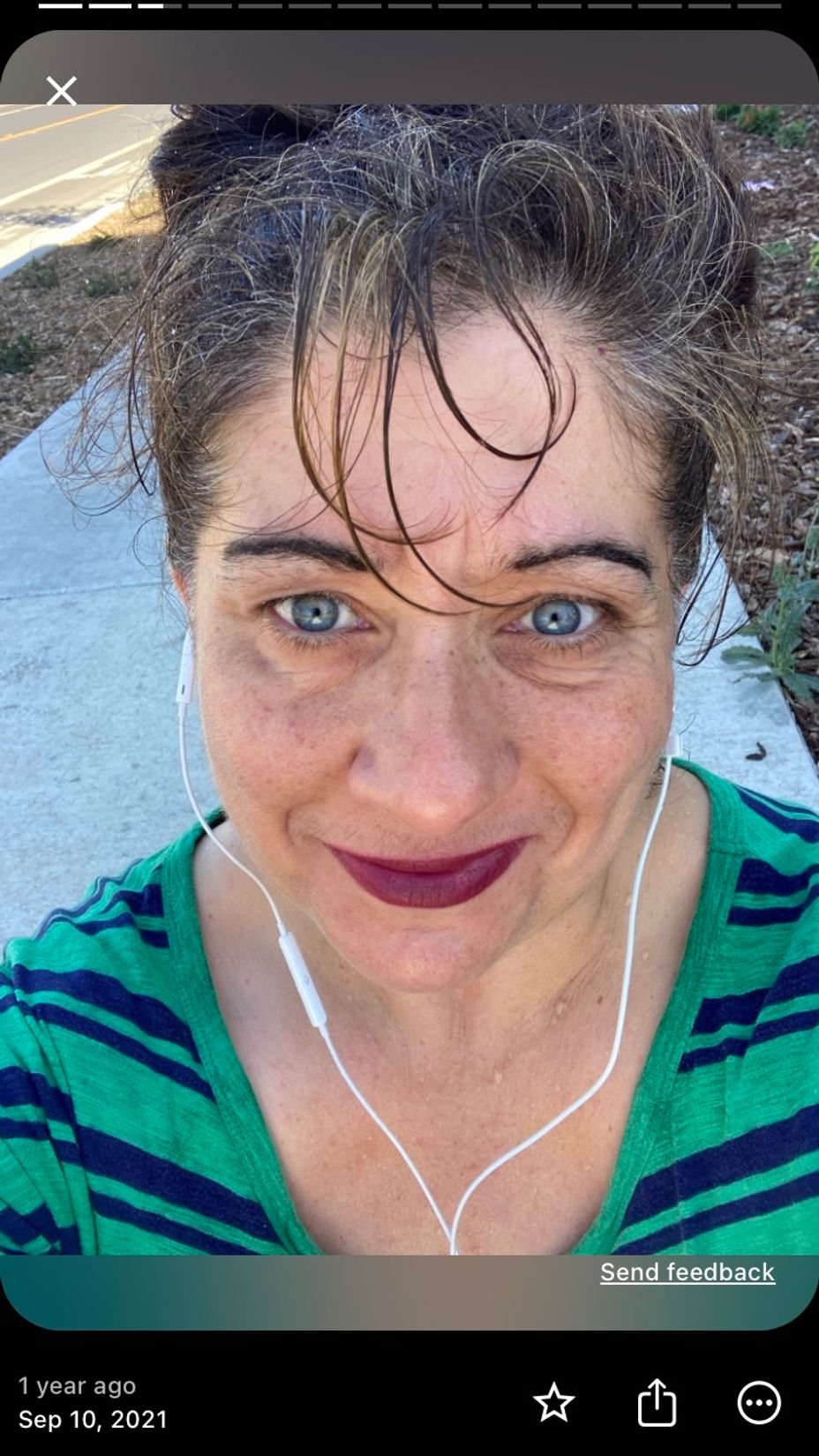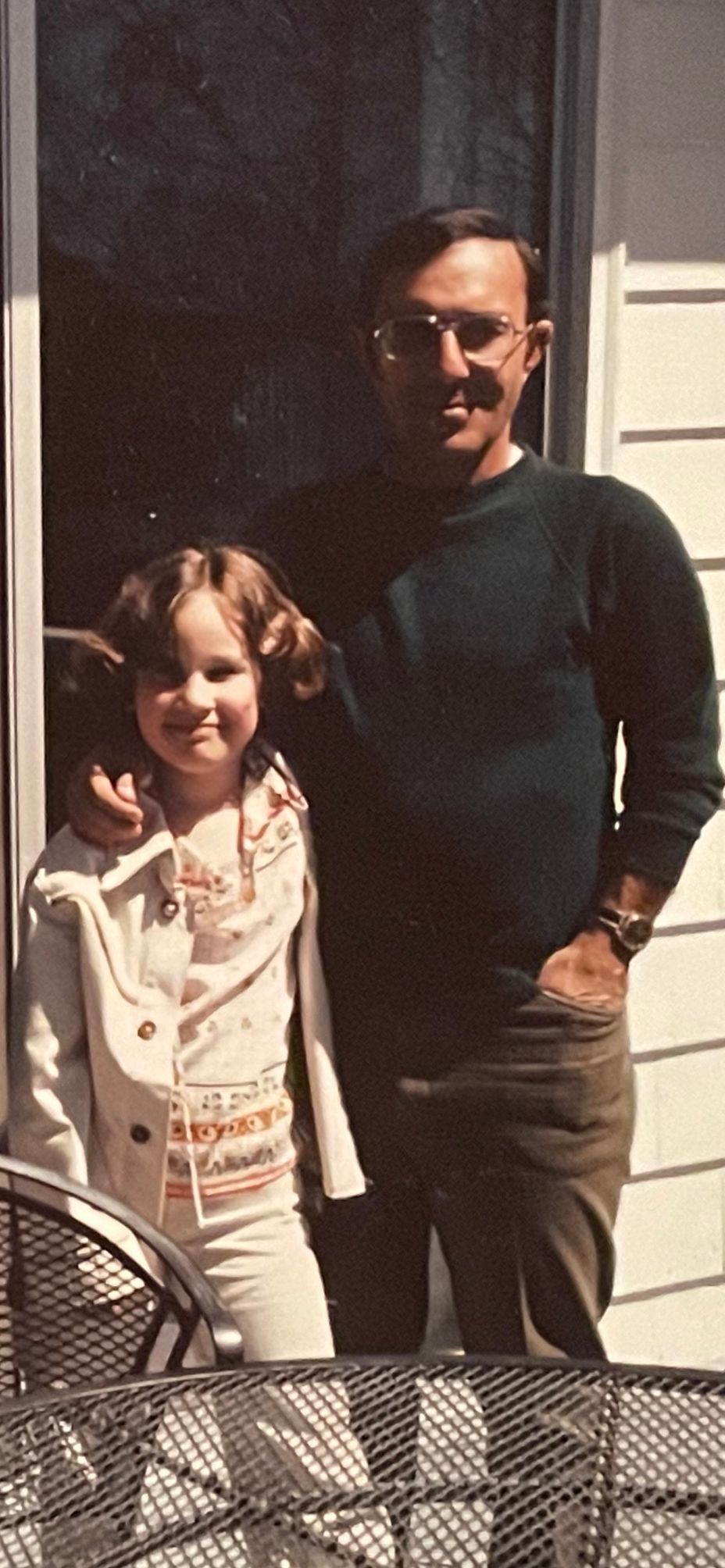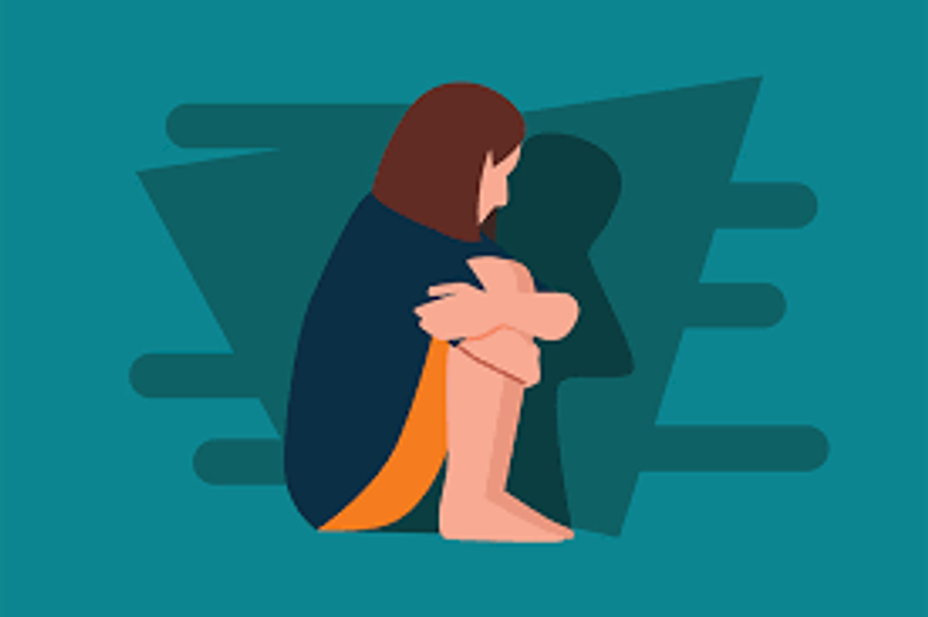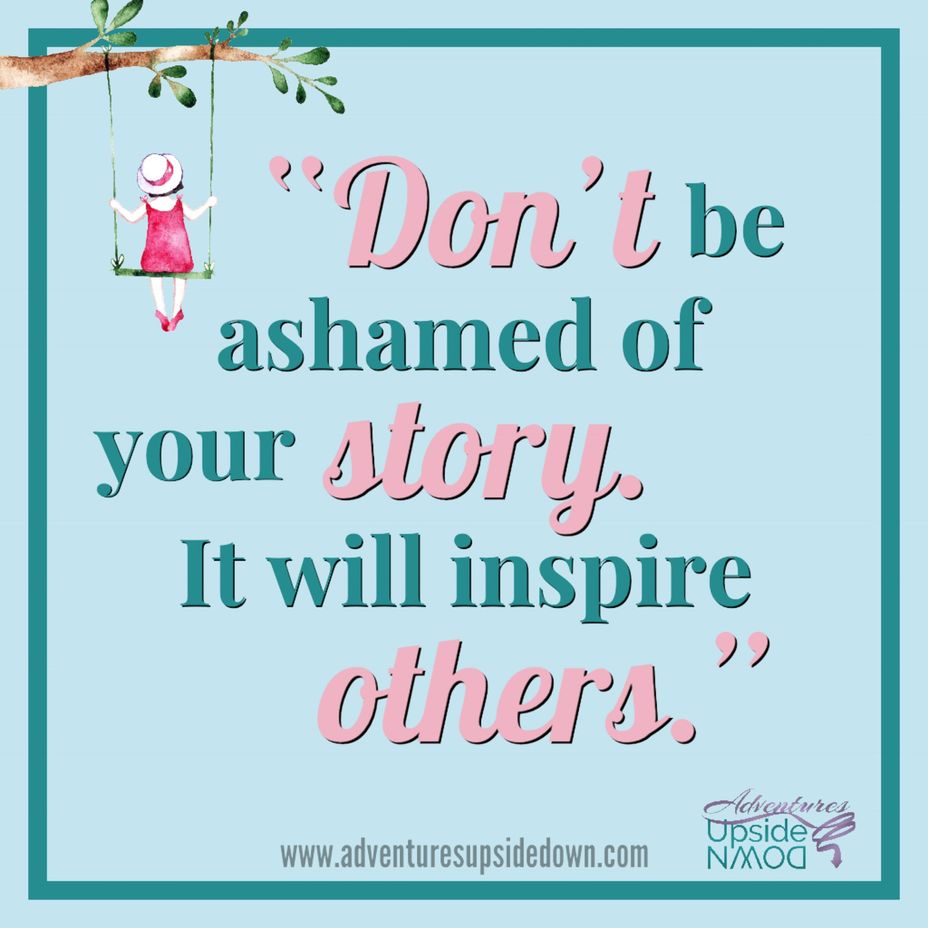Stories2Connect
Stories2Connect


Please, say their name. Please.
By Lisa Sugarman
The first time my dad Jim died, it was the first of August, 1978.
His death came with no warning. On Monday night he tucked me into bed, said he loved me, kissed my mom, and went downstairs to watch his Red Sox play a late-evening summer game. By Tuesday morning, he was gone, taken by a heart attack in his sleep and leaving a gash through my heart that would never fully heal. Could never fully heal. I was barely ten years old when my dad died that first time and I was the textbook definition of a daddy’s girl, so it toppled me face first. I was lost and shattered and confronted with the unbearable reality that the person who I felt most secure with in the world was gone.
Whether it was peak bagging together in the White Mountains or handing him tools while he changed the oil in his ‘77 Datsun 280Z or berry picking on the trails behind our house or watching Star Trek squished in his leather easy chair every night after dinner, I savored every chance to be by my dad’s side. Always.
I once heard sports commentator Stuart Scott call an athlete cool as the other side of the pillow and that always reminded me of my dad, because that’s who he was to everyone who knew him. Especially me. From what I remember from our time together as father and daughter, he was soft spoken and kind, loving and genuine, with an adventurer’s soul. He always wanted to be in nature or driving fast around a track or testing his body’s limits on the tennis court or with his tattered red Eastern Mountain Sports daypack on his back. And he gifted his passion for those things to me. So, as you’d expect, there hasn’t been a single day since he left us in the summer of ‘78 when I haven’t felt the pain of that loss deep in my bones.
That was how his first death changed my life.
The second time I lost my dad I was in my mid-forties, when I learned he’d actually taken his own life. The heart attack was just a story my mother invented to spare me the pain of living out my life knowing that my father had chosen to leave us. In her mind, it was devastating enough for me that he was gone; she just couldn’t bear to pour more kerosene on an already raging fire. So needless to say, this impossible truth blew me to pieces. Because this new and ugly narrative required a completely different kind of grieving, starting from scratch all over again. The kind of grief you can never prepare for at any stage of life.
The thing about grief is, it’s deceptive and irreverent and it shows up both when we expect it to and, most often, when we don’t. See, the grief we carry for our people really does stay with us for the rest of our life; it just oozes more on some days than on others. That’s why, in the decades since my dad left us, I’ve endlessly searched for ways to feel close to him—ways of keeping his memory and his presence alive in a world where his physicalness is gone forever. As a way of softening the grief. And that search has led me to discover a couple of powerful ways to stay connected to someone we’ve lost, regardless of how or when we lost them.
One thing in particular that instantly brings me closer to my dad is saying his name out loud. This simple little gesture just buoys my heart when the name Jim hits the air and there’s another human there to receive it. Even better is when someone who knew my dad shares a memory or a story or says his name on their own in casual conversation. That’s a one-of-a-kind kind of gift. Because being without your person for over four decades means you’re left without a part of yourself for all that time—a vacant space that can and should never be filled by anyone else. And it sucks. It’s akin to finishing a jigsaw puzzle and finding one of the pieces is missing. The image is still represented, but the empty space makes it incomplete. So, hearing or speaking my dad’s name somehow fills that empty space for me, if only for a few short seconds. I might even go so far as to say that moments of intense grief bring my dad back to the present moment, making him feel a little less gone somehow. Even all these years later, I find that certain things and places and people help to temper that loss, if only for a blink. But I’ll take even a flicker of time when I get to feel him closer to me.
Whether you’re experiencing a new loss or, like me, you’ve been grieving someone’s death for most of your life, accepting that grief is cyclical is just a core tenant of the whole grieving process. Because grief is for life, we just experience it in different ways and at different levels along the way. And I’ve learned we need to honor and make space for the ebb and flow of that river when it comes throughout the course of our lives, without trying to avoid or dismiss it. Because, when we reject feelings of sadness or loss that are attached to someone we’ve lost, those feelings don’t just evaporate over time. Instead, those murky emotions will just continue to pool up in our hearts until, eventually, they spill out all over us when we least expect it.
Now, I’m by no means a grief counselor, but I have lost a parent, a cousin, and a close friend to suicide. I’ve also said goodbye to my share of friends and family members starting when I was nine. So, I’ve spent the better part of my life accompanied by grief, and it’s given me a pretty unique perspective through which to better understand the emotions we cycle through when we lose someone we love. And it’s because of that that I’ve learned a couple of valuable lessons that may help you better navigate your own individual journey through grief.
Lesson #1 : There’s great comfort to be found when you say someone’s name after they’re gone.
By using a loved one’s name after they die, we actually honor the life they lived and the impact they had on us and the world around them. Because when we say their name, we create space to talk about our person and share the memories that helped make them so important to us. And that’s food for the soul.
Lesson #2 : Grief isn’t linear, it’s more like a circle that we travel around again and again over the course of our life. So, we need to embrace the waves of sadness and loss when they come because we’re always going to double back to points when our grief feels more present regardless of how long our person has been gone.
No matter where I’ve been along the timeline of my life—as a newly fatherless child or as a bride walking down the aisle or as a new mother holding my newborn daughters for the first time—grief has been right there with me, in moments of extreme sadness or joy or fear or accomplishment. And what I’ve realized is that grief is like a translucent film that rests on top of our day-to-day life. It’s always present but it’s often undetectable to the naked eye, until there’s a happening or an occasion for it to rise and become tangible again. Then it recedes back into the shadows. And that back and forth is the only real constant about grief. Either way, it’s always there.
We need to give ourselves permission to grieve how we grieve, regardless of how long it lasts or what it may look like or how it might make us (or others) feel. We need to embrace the suck and allow ourselves to sit in our feelings and feel all the feels. Then we need to share with the people closest to us what we need and how we need it by encouraging them to talk about our person, to ask questions, to mention their name, to remember them. These are the things that will keep us tethered to our person and give us a way to keep them alive. And saying their name aloud when we feel them is one of the most powerful ways I’ve found of accomplishing that, because it’s a reminder that we can grieve and feel joy all at the same time.
So please, say their name. And say it often.
If you or someone you know is in crisis, please call the Suicide Prevention Lifeline at 1-800-273-8255.
Being a Survivor isn't Easy#Stories2Connect
#MightyTogether We lost our son to suicide and then 2 years later my brother. I have always enjoyed writing and became part of my healing in this grief journey... eventually I turned it into 2 books which were published about a month ago. If you'd like to check them out, you can find them on Amazon. I hope you all continue to find measures of peace as you journey on.
us.amazon.com/Bruised-But-Not-Broken-Journey/dp/B09GZ98ZH5/ref=sr_1_1
https://us.amazon.com/Relationship-Status-Life-Complicated-Counsel/dp/B09GZJVMBS/ref=pd_sbs_1/141-5451713-8470724?pd_rd_w=R4ehD&pf_rd_p=0a3ad226-8a77-4898-9a99-63ffeb1aef90&pf_rd_r=CJRMJ243HAMV60QY1898&pd_rd_r=ac62a1f2-80f7-4fa4-bc0f-29aca80697c8&pd_rd_wg=LLRIq&pd_rd_i=B09GZJVMBS&psc=1

Motivation for PTSD
People always ask me what motivated me, what kept me sane during one of the darkest times of my life when I was abusing medication to manage my PTSD. And I always tell them READING!
In this digital world, we forgot that reading is the biggest meditation of the mind. Medical marijuana and the stories surrounding it kept me motivated and among these stories, the one that stood out most for me was of a 55 years old veteran who battled PTSD. Here is that story: mdberry.com/effectiveness-medical-marijuana-ptsd
I am sharing this with you guys especially those who are dealing with mental health problems so that you can read and see the impact of a story on your mental activity.
#MentalHealthHero #MentalHealth #PTSD #Motivation #Stories2Connect
Writing my story
#Stories2Connect #helpingothers #homelessness #Recovery
Hi guys. I’ve noticed a few people mention that they have shared their stories about mental health challenges and some even mentioned they got them published in various pamphlets, magazines, etc. I’m curious if there are certain to reach out to about this or do I just share some of my stories here on the mighty? Thanks everyone!!
Just saying hello & introducing myself
Hello Mighty community,
I’ve been wanting to come on here and introduce myself for a few days now, but I’ve been struggling to find the words because of the fear that I might say the wrong thing or put too much out there because I’m a private person. However, I realized I have to start somewhere and that all of us have stories of things we’ve gone through or are currently going through and it helps when you can share your experiences because you never know who can relate or just is in need of support and being understood.
So here is a little bit about myself: I am a 22 year-old with a mild version of Cerebral Palsy that affects my balance and muscle movements primarily in my torso and legs. I also have been dealing with anxiety for 6 years now.
I’ve had CP all my life so for me it’s all I’ve ever known. My walk which is very untraditional and jerky, might not seem normal to others, but to me, it is my normal because I don’t know any different. I often get looks of sympathy and confused stares ( as I’m sure many of you with CP or a visible disability can relate to). As I got older, I have had total strangers come up to me and ask if they can pray for me to be healed. To be honest, comments like this used to bother me and sometimes still do, but overall I’m content with this part of me and wouldn’t have it any other way. Yes, sometimes I have hard days. As I’m getting older, I find that I have to stretch and strengthen my muscles more often in order to avoid having hip or foot problems. I also find myself having to take breaks while on long walks to avoid aches and pains. Despite some challenges CP has given me, it has also given me opportunities. Opportunities to better myself and strive to reach my full potential, discover my strengths and breakdown boundaries and that is what matters more to me.
If anything, what I’ve found to be quite a challenge at least from my experience, is when my CP and anxiety clash together. When I find myself anxious especially in new & uncomfortable social situations, my anxiety kicks in and my muscles tense up to the point where it’s difficult for me to communicate. This in itself has been a tough mental battle. When I was first struggling with anxiety, I was in a really low point in my life struggling with low self-esteem. And although I’ve learned and grown a lot from that period, it still takes a continuous effort on my part to remind myself that I am worthy of the same love and respect that I give to others. And so when the two interact with each other, it’s easy for me to get frusturated and quite self conscious. However, during those times, I try to calm myself down and remember to make the best out of every situation. It doesn’t always work, but I get through it.
Anyway, that’s a little about me. I just want to add that I am here to listen, learn, and grow. At the end of the day we are all human beings and our stories and experiences are valid. #CP #Anxiety #Stories2Connect .
One More Day #Stories2Connect #Grief #AfterSuicideLoss
When we hear about loss in the world, it gives us pause. It reminds us of our own loss. Families impacted, families lost, loved ones gone, friends gone too early. It reminds us of our own mortality. It reminds us that it is important to love all those around you for we know not the time nor date. Life comes at us fast and can be taken just as quickly. For those who've lost, I share with you these words:
If I had just one more day,
What would I say?
Would it make you stay?
I love you. I need you.
Just one more day.
Don't go. Not yet.
We'll all be upset.
If I had just one more day
What would I say?
Did I not take the time to see?
Was this the only way to be pain-free?
I can't let go. I can't forget.
From that day forward,
It's been all regret.
Where did I go astray?
How did I let you slip away?
Why wasn't I there that fateful day?
If I had just one more day,
What would I say?
Would I even know the right things to say?
Because I didn't on that final day, and in my thoughts...that will always stay.
But if you get just one more day,
Always take the time to say,
"I love you. Is there something YOU want to say?" I'm here to listen to you today.
And If I had just one more day,
Now I know what I would say. Nothing.
I would just simply be there for you on that day.
I would just listen. With my heart, my ears, to your dreams, fears, and tears. Sometimes there is nothing we can say, but we all could use...just one more day. - Phillip Tyler
#Stories2Connect #lossofchild #SuicideLossSurvivor #SuicideAwareness #Grief #griefjourney
Quote of the Day (11/24)
“I have had to experience so much stupidity, so many vices, so much error, so much nausea, disillusionment and sorrow, just in order to become a child again and begin anew. I had to experience despair, I had to sink to the greatest mental depths, to thoughts of suicide, in order to experience grace.”
Hermann Hesse, Siddhartha
I have begun anew. A year ago, on my way to my parent's for Thanksgiving, I stopped for several hours at a spot where I planned to end my life. To think, a year ago there was no hope for another year, and yet a year later here I am. Undeserving and ashamed of receiving grace and thankful to have it bestowed upon me anyway, I have begun anew. I imagine I will have to begin anew several more times in my life, but I'll always be thankful for the opportunity to do so. 💕
#MightyQuotes #MentalHealth #BipolarDisorder #Depression #Suicide #Selfharm #Recovery #Stories2Connect #CheckInWithMe
Suicide Awareness #Stories2Connect
When I was 11 I attempted suicide. 11. Just a baby really. Back then, there wasn't a tolerance for mental illness. Not many people knew what to do with it. I remember my mom being pissed at me, my dad as well. I remember my brother not understanding. They would ask me why and I had no answer. And I distinctly remember NEVER speaking of it again. Never. It was something shameful, something to be kept hidden from other people for fear of what they would think, what they would say. That's a heavy burden for an 11 yr old who just tried to end her life. I remember being told, "You have no reason to want to die." And, "How selfish are you?" And, "There are so many people who have things worse than you, and they aren't trying to die." It was a lot to handle at that age as I had no defense. I felt like I'd done something horribly wrong and that I should be ashamed of myself. I was given no meds. No diagnosis. My mom didnt think I needed to be hospitalized.....she and my family had a thing against the "crazy hospital." Like if I went there it would be bad for me or something. I don't blame my family for how they reacted. I'm sure they were shocked and didnt know how to proceed. I mean, back in 1993 mental illness wasnt as accepted as it is now....and lmao it isnt very accepted nowadays so I can imagine how hard it must've been to deal with back then. I imagine they were lost on what to do for me, what to say. I survived and learned to be ashamed of myself. Then when I was 16 I attempted again. This time they gave my mom no choice, I went to the crazy hospital. I was diagnosed with depression, and given depression meds and counseling. They can't diagnose bipolar 1 disorder until they've had a mania along with the suicide attempts. So, I was on the wrong meds. My family didnt react as harshly that time, but they still had no idea what to do around me, what to say. And that's why this needs to be talked about. Frequently. I was a baby, I almost died, and not a single soul that I knew could offer me any words of comfort, understanding, compassion, the understanding that if I found myself in that place again that I could go to them, that I had a support system. I had nothing. I was ashamed, confused, sad, and tired. So very tired. And yet life still went on like normal....LOL Talk about depression, talk about suicide, make it a normal conversation you would have with your kids the same kind of conversation you would have about sex and drugs. Mental illness and suicide should be on that list of things to discuss. So they will know what to do when they feel that way. So they know they can come to you without judgment and you will take the steps to help them. They should know they are not alone and it's ok to feel that way. They should know that there is help for them. That there are millions of people just like them that are living full lives and they can totoo. Talk to your babies. #MentalHealthAwareness

